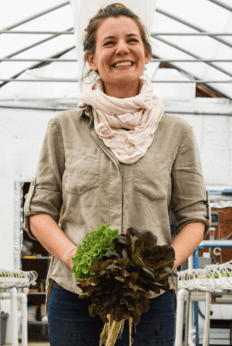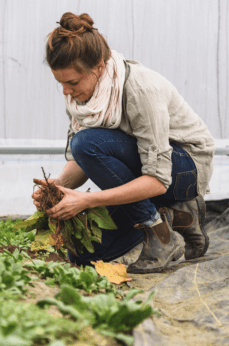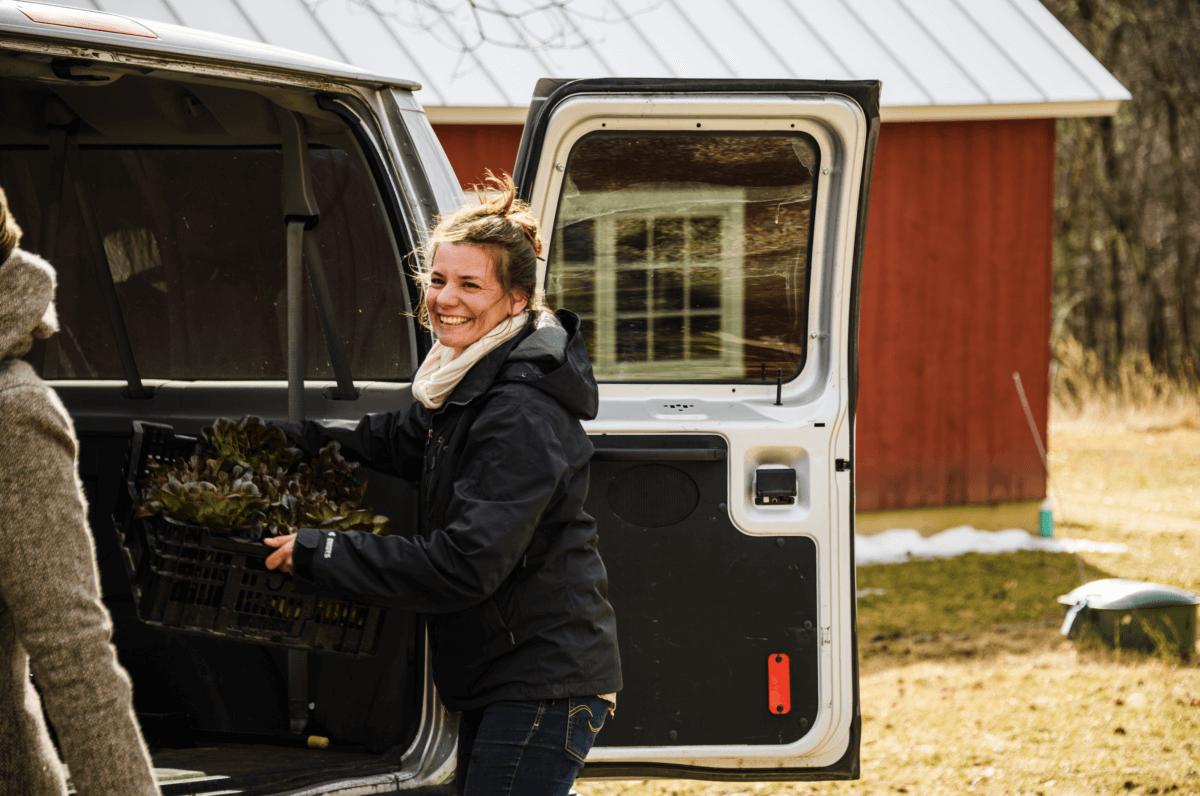Meet the Farmer Championing Fair Food Prices While Fighting Food Insecurity
Renee Giroux solves a distribution puzzle for small farmers and brings fresh produce to those who need it most.
“Everyone used to joke that I would deliver my second child in my station wagon while I was making produce deliveries,” Renee Giroux recounts. As the general manager of the nonprofit Northwest Connecticut Food Hub (NWC Food Hub), Giroux spends a lot of time in that station wagon. She coordinates the pickup and delivery of 35 Litchfield county farms’ fresh, locally grown produce to area food pantries (as donations) and wholesale customers, such as schools, grocery stores and restaurants.
It’s a lot of work and a lot of organization. But it’s work that Giroux happily chooses. From 2013 to 2016, she was the New York City restaurateur David Bouley’s farmer, growing more than 300 types of herbs in downtown Manhattan. But then in 2017, Giroux and her pastry chef husband moved to Litchfield County to start their own farm. She quickly identified problems within the distribution system.
“Small- to medium-sized farms rely on sales just like other businesses. Growing the product isn’t the problem,” says Giroux. “The problem is finding the channels of distribution. Food hubs bridge the marketing, sales and distribution channels while taking out any middlemen.”
In a feasibility study conducted by the nonprofit Partner Sustainable Healthy Communities in 2015, the local farmers expressed a common desire for a Food Hub.
So, Giroux started one.

The NWC Food Hub brings local farmers together to create community, collaborate and understand the bigger issues they face. “It can be really challenging for small farms to hire the appropriate staff and meet the needs of our overall community,” says Giroux. The overarching goal is to bridge the gap between the food insecure, food pantries, farm-to-school projects and feeding the general population.
“My mission is so simple: It is to raise awareness about small family farms throughout New England and beyond; to show how strong and mighty and resilient we all are; how we are the backbone and the fabric to a lot of our communities,” says Giroux. “Every morning you should think of your farmer.”
In Connecticut, small farms represent 28 percent of the total farms, many of which are first-generation farms. Small, first-generation farms are often susceptible to common business start-up issues. The NWC Food Hub aims to help the local agriculture sector’s 200 farms overcome common hurdles, such as establishing social connections and distribution channels.
Additionally, Giroux advocates for fair farmer pricing. Whether the food is sold to wholesalers or donated to nonprofits, the farmers receive the same price for their produce made possible through grants.

The local farms Giroux works with grow more than 100 different varieties of local produce, including microgreens, cut greens, corn, apples, cucumbers, collard greens, kohlrabi, tomatoes, chicory, endive and more.
This past year, the NWC Food Hub distributed more than 100,000 pounds of produce to 16 food pantries, 24 schools and numerous restaurants and grocery stores. All produce is uploaded weekly, on Sundays, by the farms, and the ordering platform opens up Monday for nonprofits and wholesale buyers to place their orders. “Everything is fresh in, fresh out. By working together as a farm team, we post what we have available, the orders are placed and, within 24 hours, it is delivered to the consumer, on children’s plates or being handed out at the food pantries,” says Giroux.
Crop planning and future projections are made in the offseason by larger food pantry directors. The majority of Food Hub’s funding comes through a Local Food Purchase Assistance Cooperative Agreement Program grant, with additional donations provided by local nonprofits and individuals. They are currently funded through 2025, “but, ideally, we’d like to break even by 2024 so we don’t have to rely on donations,” says Giroux.
Finding pantries to which to donate the excess produce is the easiest part of the job, as they are small and do not have much funding to purchase fresh produce to serve their clients. According to the nonprofit United for Alice, in 2021, of Connecticut’s more than 1.4 million households, 552,710 (35 percent) had incomes below the ALICE Threshold of Financial Survival. (ALICE stands for Asset Limited, Income Constrained, Employed or earning more than the Federal Poverty Level but not enough to afford the basics where they live.)
NWC Food Hub also works with ProduceRx and NourishRx to provide curated boxes of farm-fresh produce for patients with specific medical needs. Giroux coordinates with Charlotte Hungerford Hospital in Torrington, CT, which focuses on getting nutritionally dense food to patients with underlying health conditions, specifically Type 2 diabetes. Numerous studies show that “produce prescriptions” (under the umbrella of “food as medicine”) positively affect patients’ diets, decrease food insecurity, increase disease management and reduce overall healthcare costs.
After seven years of ups and downs, NWC’s Food Hub model is now running smoothly. “When it started, it was just me, boots on the ground, doing everything,” says Giroux. She was the entire enterprise, handling invoicing, deliveries, taking orders and forging connections. The NWC Food Hub now has a small network of volunteers, two drivers and a coordinator to communicate with farmers as well as solve any last-minute order issues. With the NWC Food Hub running in a higher gear, Giroux’s own Subaru should get some rest.
Follow us

This work is licensed under a Creative Commons Attribution-NoDerivatives 4.0 International License.
Want to republish a Modern Farmer story?
We are happy for Modern Farmer stories to be shared, and encourage you to republish our articles for your audience. When doing so, we ask that you follow these guidelines:
Please credit us and our writers
For the author byline, please use “Author Name, Modern Farmer.” At the top of our stories, if on the web, please include this text and link: “This story was originally published by Modern Farmer.”
Please make sure to include a link back to either our home page or the article URL.
At the bottom of the story, please include the following text:
“Modern Farmer is a nonprofit initiative dedicated to raising awareness and catalyzing action at the intersection of food, agriculture, and society. Read more at <link>Modern Farmer</link>.”
Use our widget
We’d like to be able to track our stories, so we ask that if you republish our content, you do so using our widget (located on the left hand side of the article). The HTML code has a built-in tracker that tells us the data and domain where the story was published, as well as view counts.
Check the image requirements
It’s your responsibility to confirm you're licensed to republish images in our articles. Some images, such as those from commercial providers, don't allow their images to be republished without permission or payment. Copyright terms are generally listed in the image caption and attribution. You are welcome to omit our images or substitute with your own. Charts and interactive graphics follow the same rules.
Don’t change too much. Or, ask us first.
Articles must be republished in their entirety. It’s okay to change references to time (“today” to “yesterday”) or location (“Iowa City, IA” to “here”). But please keep everything else the same.
If you feel strongly that a more material edit needs to be made, get in touch with us at [email protected]. We’re happy to discuss it with the original author, but we must have prior approval for changes before publication.
Special cases
Extracts. You may run the first few lines or paragraphs of the article and then say: “Read the full article at Modern Farmer” with a link back to the original article.
Quotes. You may quote authors provided you include a link back to the article URL.
Translations. These require writer approval. To inquire about translation of a Modern Farmer article, contact us at [email protected]
Signed consent / copyright release forms. These are not required, provided you are following these guidelines.
Print. Articles can be republished in print under these same rules, with the exception that you do not need to include the links.
Tag us
When sharing the story on social media, please tag us using the following: - Twitter (@ModFarm) - Facebook (@ModernFarmerMedia) - Instagram (@modfarm)
Use our content respectfully
Modern Farmer is a nonprofit and as such we share our content for free and in good faith in order to reach new audiences. Respectfully,
No selling ads against our stories. It’s okay to put our stories on pages with ads.
Don’t republish our material wholesale, or automatically; you need to select stories to be republished individually.
You have no rights to sell, license, syndicate, or otherwise represent yourself as the authorized owner of our material to any third parties. This means that you cannot actively publish or submit our work for syndication to third party platforms or apps like Apple News or Google News. We understand that publishers cannot fully control when certain third parties automatically summarize or crawl content from publishers’ own sites.
Keep in touch
We want to hear from you if you love Modern Farmer content, have a collaboration idea, or anything else to share. As a nonprofit outlet, we work in service of our community and are always open to comments, feedback, and ideas. Contact us at [email protected].by Michelle Colman, Modern Farmer
December 22, 2023
Modern Farmer Weekly
Solutions Hub
Innovations, ideas and inspiration. Actionable solutions for a resilient food system.
ExploreExplore other topics
Share With Us
We want to hear from Modern Farmer readers who have thoughtful commentary, actionable solutions, or helpful ideas to share.
SubmitNecessary cookies are absolutely essential for the website to function properly. This category only includes cookies that ensures basic functionalities and security features of the website. These cookies do not store any personal information.
Any cookies that may not be particularly necessary for the website to function and are used specifically to collect user personal data via analytics, ads, other embedded contents are termed as non-necessary cookies.

It’s inspiring to see a farmer dedicated to fair food prices and combating food insecurity. By ensuring everyone has access to affordable, nutritious food, they’re making a real difference in their community. It’s a reminder that sustainable farming can also be socially responsible, benefiting both producers and consumers.